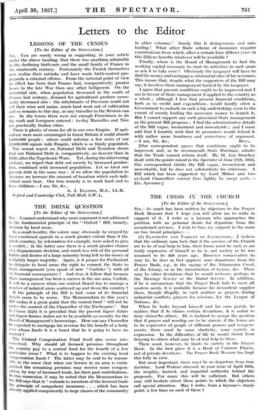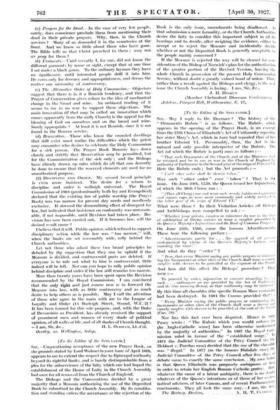THE CRISIS IN THE CHURCH
[To the Editor of the SPECTATOR.]
Sin,—So much has been written by objectors to the Prayer Book Measure that I hope you will allow me to write in support of it. I write as a layman who approaches the problem with no personal desire for departure from the accustomed services. I wish to base my support in the main on two broad principles :— (1) ELASTICITY AND VARIETY OF EXPRESSION.—! believe
that the ordinary man feels that if the services of the Church are to be of real help to him, their forms must be such as are really expressive of himself as he is, not merely as he was assumed to be 300 years ago. However conservative he may be, he does in fact approve some departures from the Prayer Book, e.g., in the saying of the Athanasian Creed, of the Litany, or in the introduction of hymns, &e. There may be other deviations that he would welcome, perhaps in the Marriage Service or the Burial Service. In addition, if he is unconscious that the Prayer Book fails to meet all modern needs, it is probably because his incumbent supplies them, though illegally, in such matters as prayers during industrial conflicts, prayers for missions, for the League of Nations, &c.
When he looks beyond himself and his own parish, he
realizes that if he claims certain deviations, it is unfair to deny claims-to others. He is inclined to accept the position that if prayer and worship are to be sincere, if the forms arc to be expressive of people of different powers and tempera- ments, there must be some elasticity, some variety in expression. In the difficulties of life he would shrink from denying to others what may be of real help to them.
There must, however, be limits to variety in the Prayer Book. In the first place it is a Book of Common Prayer, not of private devotions. The Prayer Book Measure has kept this fully in view.
But more important, there must be no departure from true
doctrine. Lord Wolmer stressed, in your issue of April 16th, the weighty, learned, and impartial authority behind the proposals. For many this will be sufficient. But others may still hesitate about those points to which the objectors call special attention. May I write, from a layman's stand- point, a few lines on each of these ? (a) Prayers for the Dead.— In the ease of very few people, surely, does conscience preclude them from mentioning their dead in their private prayers. Why, then, in the Church services ? Many of us demanded it in the cemeteries at the front. And we know so little about those who have gone. The Bible tells us that Christ preached to them ; may not we pray for them ? (b) Vestments.--17ntil recently I, for one, did not know the different garments by name or sight, except that at one time I sat under a black gown. To the ordinary layman they have no significance; until interested people drill it into him. He cares only for decency and appropriateness, and deems the matter one unworthy of controversy.
(c) The Alternative Order of Holy Communion.---Objectors suggest that there is in it a Romish tendency, and that the Prayer of Consecration gives colour to the idea of mechanical change in the bread and wine. An unbiased reading of it seems to me in no way to support these objections. The main innovation (if that may be called an innovation which comes apparently from the early Church) is the appeal for the blessing of God on ourselves and on the bread and wine. Surely appropriate ? At least it is not Romish, since it is not found in the Roman service.
(d) Reservation.----Those who know the crowded dwellings that still exist must realize the difficulties which the priest may encounter who desires to celebrate the Holy Col-nonillion for a sick person. The Prayer Book Measure lays down clearly and strietly that Reservation May be permitted, but for the Communication of the sick only ; and the Bishops have already drawn up rules which do all that can decently be done to ensure that the reserved elements are used for no unauthorized purpose.
(2) DISCIPLINE AND ORDER.- - My second broad principle is even more insistent. The desire for a return to discipline and order is wellnigh universal. The Royal Commission of 1904 (predominantly both lay and Evangelical) declared that the existing law of public worship (the Prayer Book) was too narrow for present day needs and needlessly exclusive. It stressed the demoralizing effect of disregard for Jaw, but indicated that insistence on conformity was unreason- able, if not impossible, until Revision had taken place. Re- vision has now been carried out. If it becomes law, will the desired result ensue ?
I believe I lint it will. Public opinion, which refused to support disciplinary action while the law was " too narrow," will, when the limits arc set reasonably wide, rally behind the Church authorities.
Let not those who admit these two broad principles be deluded by the suggestion that they can be upheld if the Measure is divided, and controversial parts are deleted. If everyone is to rule out what to him is controversial, little indeed will be left. Nor can you hope to rally public opinion behind discipline and order if the law still remains too narrow.
More than twenty years have been spent upon the Revision recommended by the Royal Commission. I am convinced that the only right and just course now is to forward the Measure into law, with as little controversy and as much desire to help others as is possible. May I call the attention of those who agree in the main with me to the League of Loyalty and Order (14 Burleigh Street, Strand, W.C. 2) ? It has been formed for this sole purpose, and, with the Duke of Devonshire as President, has already received the support of prominent men and women of every shade of political opinion, of all walks of life, and of all shades of Church thought.
—I am, Sir, Ike., II. L. OLDHAM, Lt.-.Col. Overley, nr. Wellington, Salop.











































 Previous page
Previous page